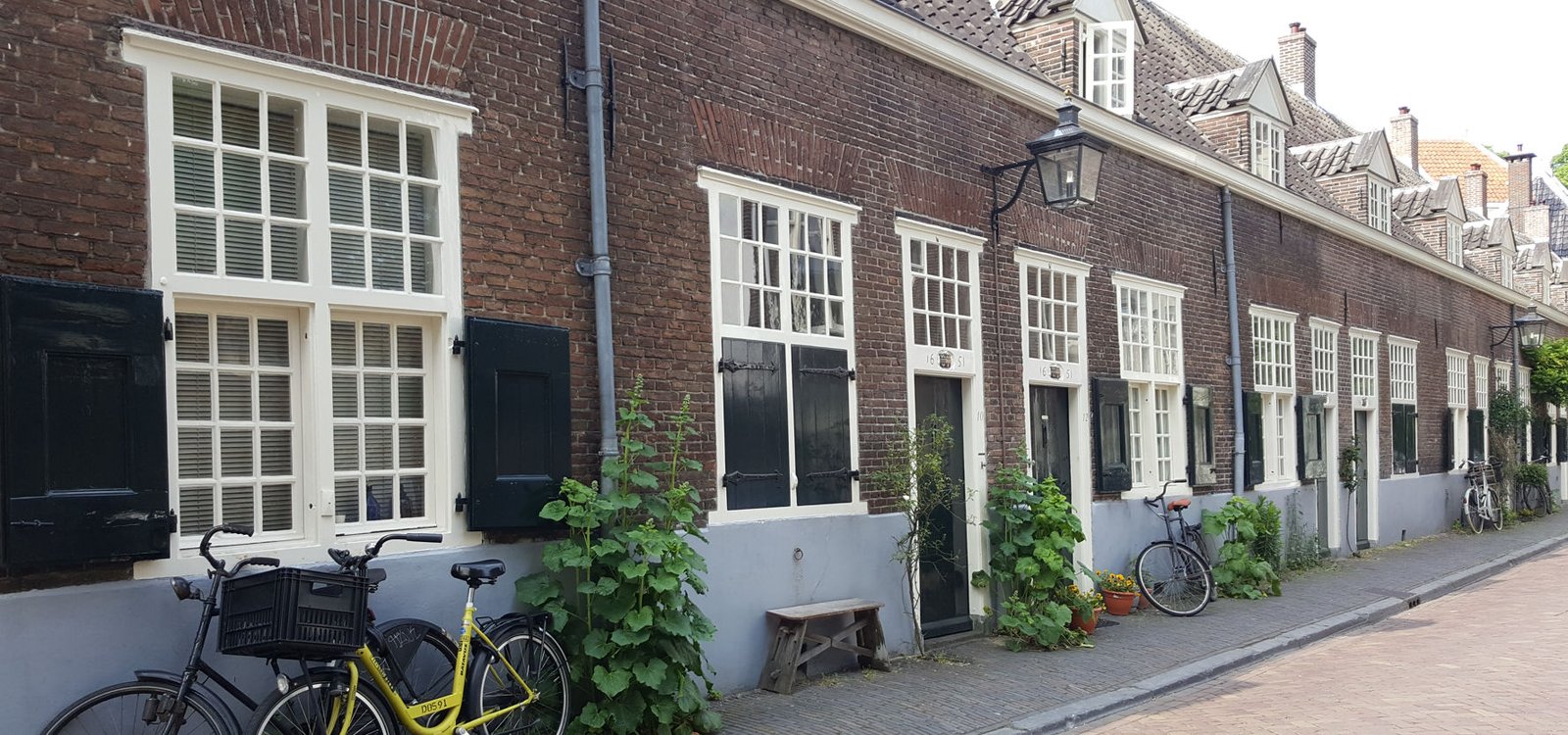
Een straat met huizen
<<<

Een straat met huizen
<<<

COA connects permit holders ("statushouders") to municipalities
When an asylum seeker receives a residence permit, the COA (Central Agency for the Reception of Asylum Seekers) connects the permit holder to a municipality within 2 weeks.
The COA assigns them to a municipality where they have the best chance of integration.
To determine the appropriate municipality for the permit holder, the COA collects information such as:
- Size of the family
- Country of origin
- Language
- Specifics about family reunification
- Housing limitations (e.g., adjustments to the living space)
- Presence of a study registration certificate
- Education
- Work experience
-- Presence of an employment contract-
- Medical particulars
- Network
- Future plans.
<<<

internet: more information
We first notice that living in the Netherlands is a problem because there is a shortage of housing. One of the reasons for this shortage is that many homes are occupied by only one person. Due to the number of divorces, there is extra demand for homes for single people. The problem also increased as people live longer in their house.
A good home is very important for the Netherlands, because in a climate that is often wet and cold, a good home is of course important.
<<<
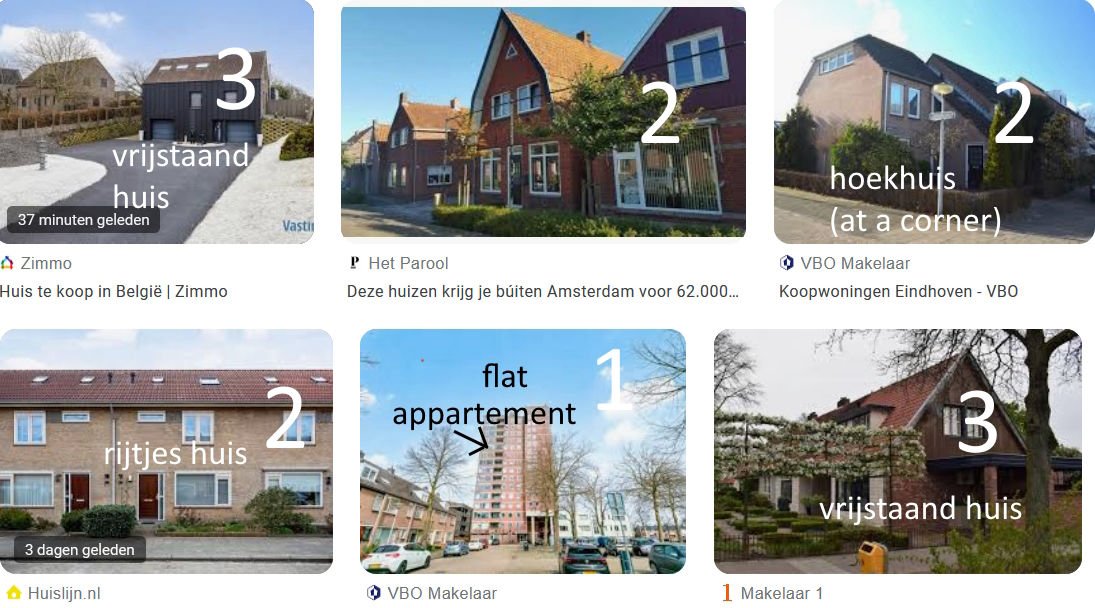
soorten huizen
<<<
1. Apartment: we mainly see apartments in the city. Often we see a large building that consists of a number of apartments. We call such a large building “a flat”. Sometimes there are special apartments for students.
2. Single-family home: it concerns a home for one family. We find these types of houses in every place. Usually they are linked together.Therefore the name "row-house" is used in Dutch. If that is not the case, we speak of a detached house. The Dutch name refers to a free hous.
3. Detached house: it is usually a house for wealthier people.
4. Nursing home: the elderly continue to live at home for as long as possible, but if that is no longer possible, they live in a nursing home. They almost never live with their children.
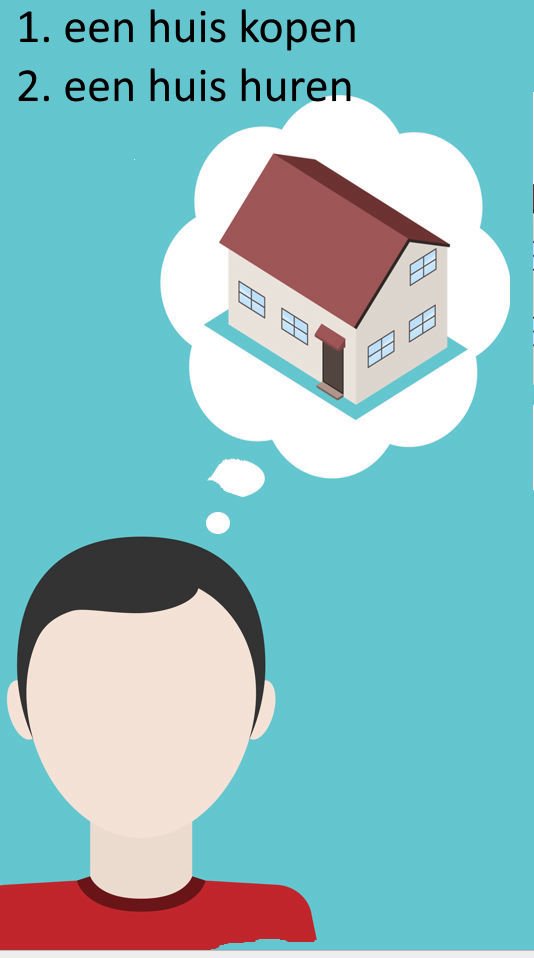
thinking of a house...
In the Netherlands, there are several possibilities to obtain a house. Here are some common options:
1: Buying a house: ("een huis kopen")
This involves purchasing a property through a real estate transaction. You can search for available houses on real estate websites, work with a real estate agent, and negotiate the purchase price with the seller.
2: Renting a house: ("een huis huren")
Renting is another common option. You can choose to rent a house from a private landlord or through a housing association. Rental contracts can vary in duration and terms, and there may be eligibility criteria depending on the type of housing.
Social housing: The Netherlands has a system of social housing, which provides affordable rental housing to individuals and families with lower incomes. To qualify for social housing, you need to meet specific income requirements and register with the local housing association.
Usually this is the way for permit holders as a first step to obtain a house.
Housing cooperatives: Housing cooperatives/Housing associations are organizations where members collectively own and manage properties. Members contribute to the cooperative and have a say in decision-making. This option allows for more control and community involvement in housing. Sometimes you need to contact the municipality for this possibility.
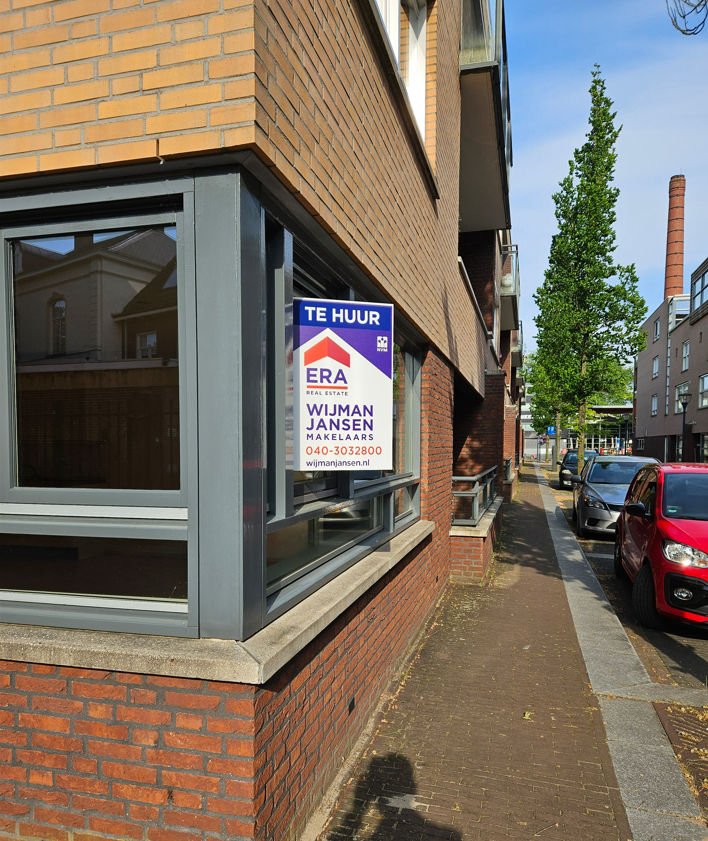
meaning rent
In the Netherlands, there are different ways you can rent a house. Here are some common options:
Private Rental Market: Many houses and apartments are available for rent from individual landlords or real estate agencies. You can find rental properties online, in ads, or by contacting local real estate agencies directly. Prices are much highter with respect to renting a house form a housing association.
Social Housing: The Netherlands has affordable rental housing called social housing. It's mainly for people with low incomes. To qualify for social housing, you usually need to register with your local government and meet certain income and other requirements. Social housing can be in high demand, so there may be waiting lists.
Student Housing: If you're a student, there are housing options just for students, like dormitories, shared apartments, or student housing complexes. Educational institutions or specialized housing organizations provide these options.
Short-Term Rentals: If you only need a place to stay temporarily, there are short-term rental choices. You can rent furnished or serviced apartments for a shorter period. These rentals are more expensive but offer flexibility.
Housing Associations: Housing associations in the Netherlands provide rental housing, including social housing. They own and manage many rental properties. You can apply for housing through these associations, but availability may vary. Usually, your first house will be from a housing association.
Keep in mind that renting in the Netherlands can be competitive, especially in popular cities like Amsterdam, Rotterdam, and Utrecht. It's a good idea to start searching early, have the necessary documents and references ready, and consider using reliable rental platforms or getting help from local real estate agencies or housing organizations.
<<<

Talkin about...
Don't forget the insurances. An insurance is a "verzekering":
To be insured you have to pay a premium.
• Liability insurance: if you accidentally break something at someone else's home, school or on the street. It's not about your things that are broken, but someone else's.
• Contents insurance: everything in your house. If something in the house is broken (due to fire, water or theft).
• Residential home insurance: Building insurance : only for owner-occupied homes. If something breaks down in the house due to fire, storm or water. This insurance is necessary to obtain a mortgage.
• Health insurance: the basic insurance is compulsory (additional insurance is possible).
<<<
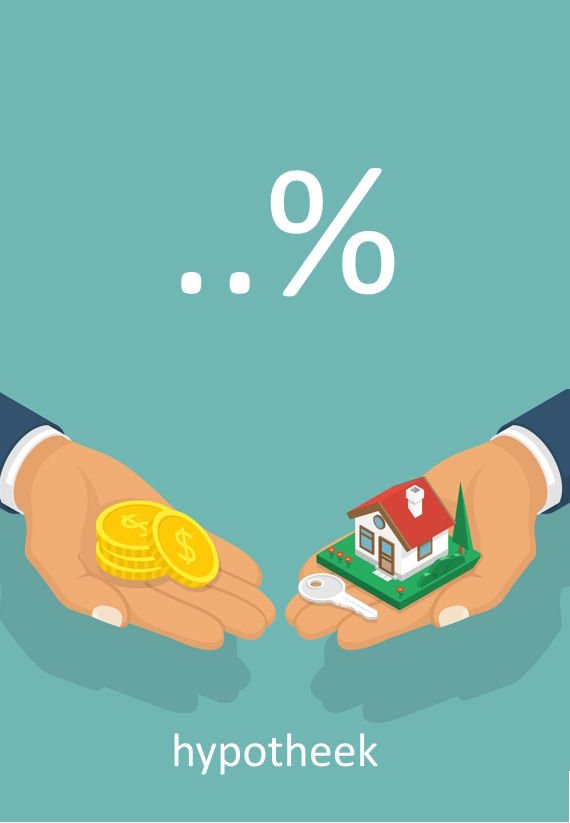
Each mortgage is related to a percentage
If you buy a house usually yu need a mortgage (loan). To get a mortgage from the bank, there are important steps to follow:
Figure out your budget: Before applying for a mortgage, you need to understand how much money you can afford to borrow. Consider your income, expenses, and savings to determine a budget for buying a house.
Research mortgage options: There are different types of mortgages offered by banks, each with its own terms and interest rates. Look into different lenders and compare their mortgage options to find one that fits your needs. Common types include fixed-rate and adjustable-rate mortgages.
Gather necessary documents: To apply for a mortgage, you'll need to provide specific documents to show your financial situation. These may include proof of income (like pay stubs or tax returns), bank statements, identification, employment verification, and details about any existing debts or loans.
Find a property and make an offer: Once you know your budget, start looking for a suitable house. You can work with a real estate agent or search online listings. When you find a house you want to buy, make an offer to the seller.
Apply for the mortgage: After your offer is accepted, you'll need to formally apply for the mortgage with the bank you've chosen. Submit all the required documents and complete the application forms. The bank will review your application, including your credit history, employment stability, and financial information.

housing association (Arabic text)
Usually you don't have enough money to buy a house. Obtaining a house through a housing cooperative in the Netherlands typically involves the following steps:
Start with housing cooperatives: Start by researching and identifying housing cooperatives in your desired location. There are various cooperatives throughout the Netherlands, each with its own rules, requirements, and available properties. Explore their websites, contact them directly, or visit their offices to gather information.
Apply for a housing permit: In some municipalities you need a housing permit. You can request this from your municipality.
•
Comply with housing corporation requirements: The housing association may set requirements for the size of your family. Or the level of your income.
Membership and registration: To participate in a housing cooperative, you usually need to become a member. Check the specific requirements for membership, which may include criteria such as income limits or other eligibility criteria. Register with the cooperative by submitting the necessary documents and completing any application forms.
Joining waiting lists: Housing cooperatives often have waiting lists for available properties. Once you become a member, you may need to join the waiting list for the specific types of properties or neighborhoods you're interested in. The waiting times can vary widely, ranging from a few months to several years, depending on demand and availability.
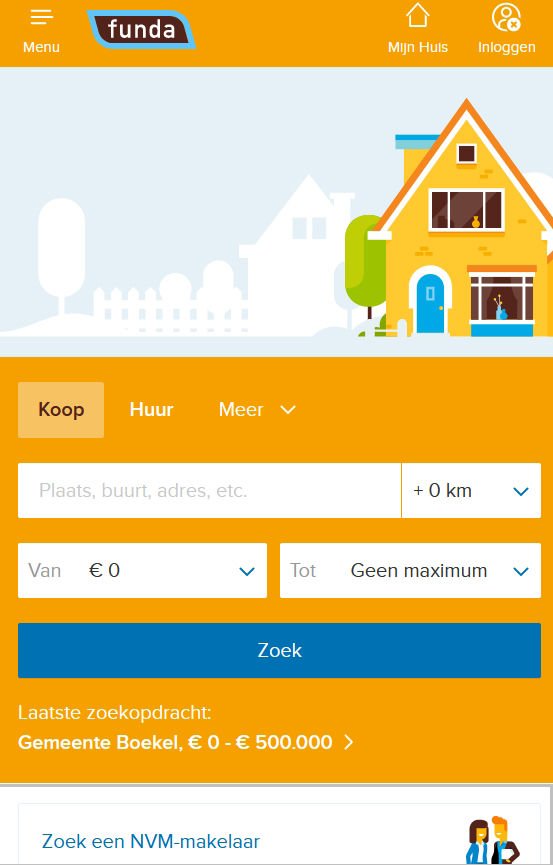
site of funda
When buying a house with a broker, here are some important points to consider:
Choose a reputable and experienced broker: Take the time to research and select a reputable and experienced real estate broker. Look for recommendations, read reviews, and consider their track record in the market. A reliable broker can provide valuable guidance and support throughout the buying process.
Clearly communicate your needs and preferences: Be clear about your requirements, preferences, and budget with your broker.
Access to listings and market information: A broker will have access to a wide range of property listings and up-to-date market information.
Property viewings and inspections: Your broker will schedule property viewings for you to visit potential houses. Attend these viewings with your broker and thoroughly inspect the property.
Negotiation and offer preparation: When you find a house you're interested in, your broker will assist you in preparing an offer and negotiating with the seller. They can provide guidance on pricing, market conditions, and terms of the offer. Rely on their expertise to help you secure a fair deal.
Contract and legal considerations: Once your offer is accepted, your broker will assist you in reviewing the contract and ensuring that all legal aspects are in order. They can work with you and your legal representative to address any contingencies, clarify terms, and ensure a smooth transaction.
<<<
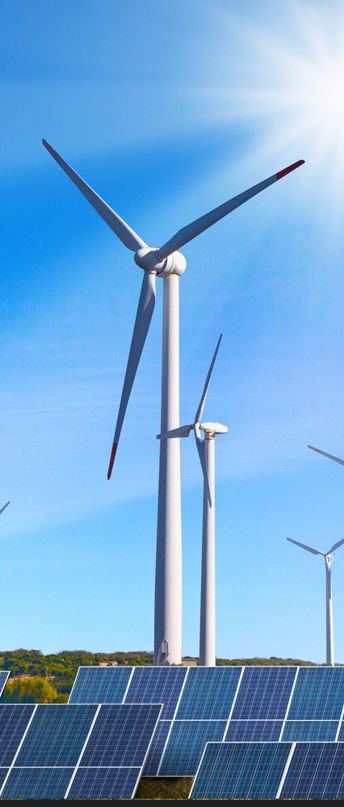
windmills everywhere
To get an energy contract for your home in the Netherlands, you need to follow several steps. Here's a simplified version of the process:
Compare energy providers: Start by comparing different energy providers to find the best contract that suits your needs. There are various comparison websites available where you can compare rates, terms, and offers from different providers.
Choose an energy provider: After reviewing the different options, choose the energy provider that fits you best. As you are not familiar with the Dutch language you will have problems with understanding the contract. Ask how they can help you.
Contact the energy provider: Get in touch with the chosen energy provider to apply for an energy contract. This can usually be done online through their website or by phone.
Provide necessary information: You may need to provide some information such as your personal details, the address of your home, the type of energy meter you have, and information about your current energy contract (if applicable).
Submit meter readings: After securing the energy contract, you'll need to submit meter readings to the energy provider. This can usually be done online or over the phone. It's important to provide accurate meter readings to ensure correct billing.
Confirmation and welcome package: Once you've provided all the necessary information, you'll receive a confirmation of your energy contract from the provider. They will usually send you a welcome package with important details about the contract and payment information.
Arrange payments: Set up the payment method for your energy bills. You can choose automatic direct debit, bank transfer, or another payment method offered by the energy provider.
Please note that the exact steps and requirements may vary among energy providers. It's always wise to follow the specific instructions provided by the chosen energy provider and direct any questions you have to them for clarity about the process.
<<<
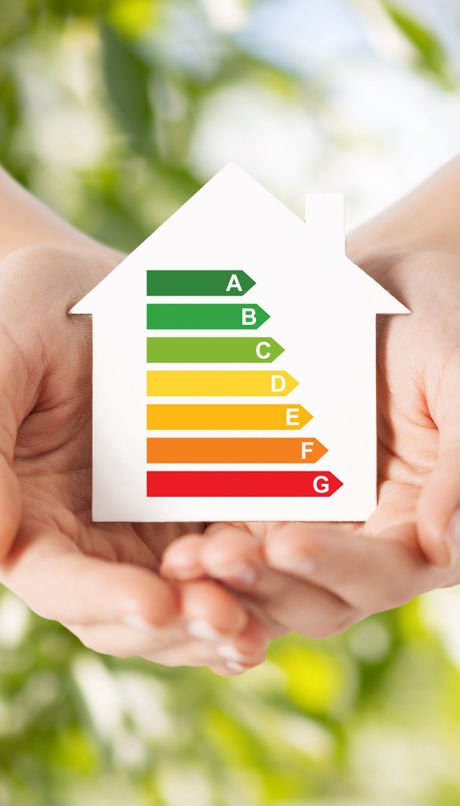
green is good
Energy is very expensive. Therfore we provide some important tips to save energy, in Dutch "energie besparen":
Use energy-efficient appliances: Choose appliances with high Energy Star ratings. They use less electricity and help you save energy.
Unplug devices when not in use: When you're not using electronic devices like chargers, laptops, or TVs, unplug them. Even when they're off, they can still use power.
Switch to LED lights: Replace old bulbs with energy-saving LED lights. They last longer and use less energy.
Adjust your thermostat: Lower the heat in winter and raise the cooling temperature in summer. You can use a programmable thermostat to automatically adjust the temperature based on your schedule.
Insulate your home: Add insulation to your home to keep it warm in winter and cool in summer. This helps you use less heating or cooling. If the house is not yours, ask the owner how to deal with isolation.
Use natural light: Open curtains and blinds during the day to let in sunlight. It saves energy by using less artificial lighting.
Seal air leaks: Check for any gaps or cracks around windows, doors, or vents. Seal them to prevent drafts and save energy.
Set water heater temperature: Keep your water heater temperature around 120°F (49°C) to avoid wasting energy. Use cold water for washing clothes and take shorter showers.
Use power strips: Connect multiple devices to power strips and turn them off when not in use. This stops them from using standby power.
Develop energy-saving habits: Remember to turn off lights when you leave a room, use energy-saving modes on devices, and avoid using energy-intensive appliances unnecessarily.
By making these simple changes, you can save energy and reduce your electricity bills.
<<<
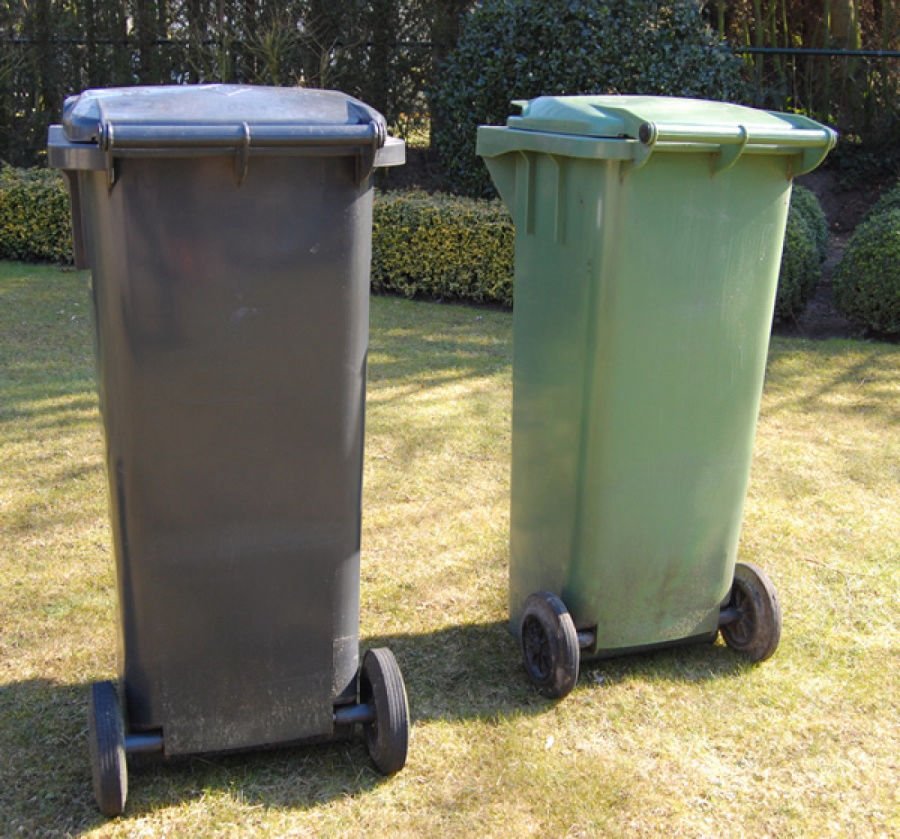
Grreen bin for organic waste and grey bin for general waste
Garbage
In the Netherlands it is important to take good care of the environment. You must separate waste and throw it in the right bin. The green bin is for organic wate the grey bin for the rest. Paper and glass go in separate bins. It is forbidden to throw garbage just away.
a few videos:
English Arabic Turkish Ukraine Polen Bulgaria Romania Dutch
Smoking
In the Netherlands, smoking is no longer as normal as it used to be. You are no longer allowed to smoke in restaurants, cafes and at work. If you smoke yourself, you must take this into account and do not smoke where it is not allowed. Smoking hash ( weed ) is allowed.
<<<
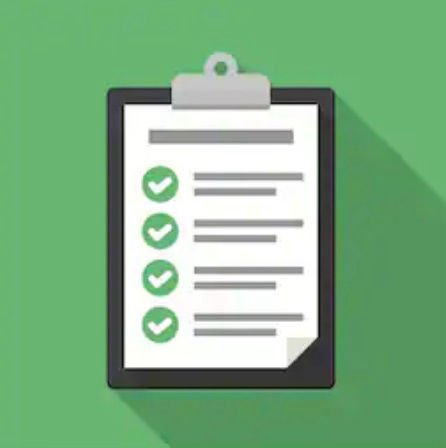
checklist
1. If you are looking for a house quickly and do not receive a declaration of urgency, you can rent a house from a private individual. This is often expensive.
2. A rental contract states how much rent you have to pay each month.
3. If the rent is too high, you can apply for rent allowance from the Tax and Customs Administration.
4. If the faucet in a rented house is broken, it is best to call the landlord. The landlord must then provide a new tap. (In a owner-occupied house you have to arrange this yourself.)
5. People with a low income can apply for a waiver of the waste levy from the municipality.
6. Glass should be disposed of in a glass container near you.
7. You must submit the meter reading for gas and electricity once a year.
8. If you no longer have electricity in your home, you should first check whether other people in the street still have electricity.
9. You can choose a telephone, television or internet subscription yourself.
10. If you break something at a friend's house, you need liability insurance.
<<<
Created with Mobirise web template